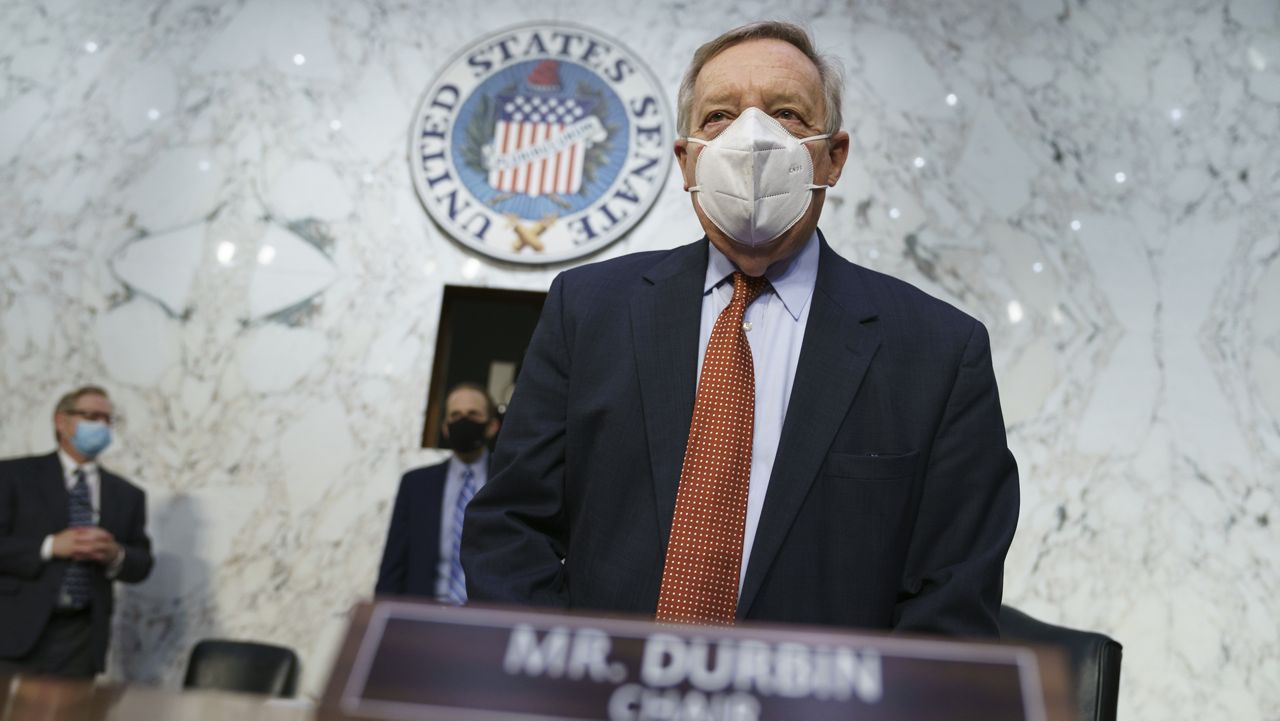"What are we doing?" Senate Judiciary Committee Sen. Dick Durbin (D-IL) asked as he opened up a hearing on gun violence on Tuesday, in the aftermath of two deadly shootings in a week. "We won't solve this crisis with prosecutions after funerals. We need prevention before shooting."
The Senate hearing, titled "Constitutional and Common Sense Steps to Reduce Gun Violence," was scheduled prior to the deadly shootings in Georgia and Colorado. The hearing took on new meaning Tuesday following the deaths of at least 18 Americans due to gun violence – one as recent as the day prior.
Sen. Durbin called gun violence in the United States a "public health crisis" and after calling for a moment of silence, asked for "a moment of action. A moment of real caring. A moment when we don’t allow others to do what we need to do. Prayer leaders have their important place in this, but we are Senate leaders. What are we doing?"
The House earlier this month passed two bills to expand background checks, the first major pieces of gun control legislation since Democrats retook the White House and the Senate. Both bills passed with some bipartisan support, but face uphill battles in the 50-50 Senate.
Regardless of those long odds, Senate Majority Leader Chuck Schumer (D-NY) pledged to put background check legislation on the Senate floor for a vote, noting that the body "must confront a devastating truth" after a lack of Congressional action on gun violence.
"This Senate will be different," Schumer said. "The Senate is going to debate and address the epidemic of gun violence in this country."
The U.S. experienced the smallest number of mass shootings in 8 years in 2020, according to a database compiled by The Associated Press, USA Today and Northeastern University, possibly in part due to the COVID-19 pandemic, but 2021 has already seen 7 mass killings. Colorado has seen several mass shootings in the last few decades, including the Columbine High School massacre in 1999 and the Aurora movie theater shooting in 2012.
Sen. Richard Blumenthal (D-CT), who has been pushing for gun control measures since the 2012 shooting at Sandy Hook Elementary School, which saw 26 people killed, including 20 children between 6 and 7 years old, expressed optimism for change after years of inaction.
"America woke today to another nightmare, stunning shocking, savage, but unsurprising because this kind of horror is thoroughly predictable as long as Congress fails to act," Blumenthal told reporters. "This time feels different. We have a President committed to ending gun violence, a majority in both houses of Congress, and most importantly, a growing grassroots movement led by a new generation, and of course our opponents are on their heels."
But Republicans are standing firm against Democratic efforts to enact gun control measures.
"Every time there's an incident like this, the people who don't want to protect Second Amendment use it as an excuse to further erode Second Amendment rights," Sen. Cynthia Lummis (R-WY) told reporters, claiming: "Their ultimate goal is to abolish our rights."
Sen. Ted Cruz of Texas said that the Senate engages in "ridiculous theater" every time there is a shooting, "where this committee gets together and proposes a bunch of laws that would do nothing to stop these murders."
"But what they propose — not only does it not reduce crime, it makes it worse," Cruz claimed.
Sen. Chuck Grassley (R-IA) said in his opening remarks that he was hopeful Democrats and Republicans could come together on common-sense gun laws, but said that the bills the House passed were not viable since they passed nearly along party lines.
The House of Representatives passed two bills earlier in March – H.R. 8, The Bipartisan Background Checks Act of 2021, and H.R. 1446, The Enhanced Background Checks Act of 2021.
H.R. 8, which had several Republican co-sponsors in the House, would expand background checks for all firearm sales or transfers, including private transactions, which are currently not required under U.S. law. The measure passed 227-203 Thursday morning in bipartisan fashion, with 8 Republicans joining Democrats in supporting the bill.
The House also passed H.R. 1446, which would close the so-called "Charleston Loophole," which allows some gun sales to go through before a background check is completed. This bill passed 218-210, with slightly less enthusiastic bipartisan support – 2 Republicans joined Democrats in voting to support the measure, but 2 Democrats voted with Republicans against it. Notably, Dylan Roof utilized this loophole to buy a firearm, which he used to kill 9 people at Emanuel AME Church in Charleston, South Carolina, in 2015.
"That is not a good sign that all voices and all perspectives are being considered," Grassley said of the House bills.
A Suffolk University-USA Today poll from 2019 showed that 90% of registered voters want universal background checks for all firearms sales. A Quinnipiac poll from 2017 shows similar margins, with 94% supporting background checks. A Pew Research Center survey from 2019 showed wide bipartisan support for background checks for gun sales at gun shows and sales at gun shows.
The debate over gun control will likely thrust moderate Sen. Joe Manchin (D-WV) back into the spotlight, as he has long championed a bipartisan gun control bill. Manchin, along with retiring Republican Sen. Pat Toomey of Pennsylvania, attempted to put together a bipartisan measure in the aftermath of the Sandy Hook shooting, but the measure failed to garner enough support to pass.



